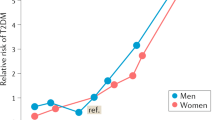Abstract
Objective:
Following unblinding of the Diabetes Prevention Program (DPP) results, a 16-session lifestyle intervention program was offered to all study participants, including those who had initially been randomized to lifestyle treatment. This study compares the effects of the lifestyle program between participants who had previous exposure and those who had not.
Design:
A 16-session behavioral intervention was conducted in groups at each of the 27 DPP sites during a transitional (bridge) period from the DPP trial to the DPP Outcomes Study (DPPOS). Session participation for this 6-month behavioral weight loss program was confirmed by originally randomized treatment groups.
Subjects and measurements:
Independently assessed weight measurements were available within a 7-month period before and after the program for 2808 ethnically diverse participants.
Results:
Participants from the lifestyle group in the DPP were the least likely to attend a repeat offering of a 16-session behavioral weight loss program conducted in groups. Weight loss during the transitional lifestyle program was strongly related to the duration of attendance in the three groups that were participating in the program for the first time (metformin, placebo and troglitazone), but not related to amount of earlier weight loss.
Conclusion:
Individuals who were naive to the behavioral program lost a greater amount of weight and this was strongly related to their degree of participation. A second exposure to a behavioral weight loss program resulted in unsatisfactory low attendance rates and weight loss.
This is a preview of subscription content, access via your institution
Access options
Subscribe to this journal
Receive 12 print issues and online access
$259.00 per year
only $21.58 per issue
Buy this article
- Purchase on Springer Link
- Instant access to full article PDF
Prices may be subject to local taxes which are calculated during checkout





Similar content being viewed by others
References
Wadden TA, Butryn ML, Byrne KJ . Efficacy of lifestyle modification for long-term weight control. Obes Res 2004; 12 (suppl): 51S–162S.
Wing RR, Phelan S . Long term weight loss maintenance. Am J Clin Nutr. 2005; 82 (suppl): 222S–225S.
Knowler WC, Barrett-Connor E, Fowler SE, Hamman RF, Lachin JM, Walker EA, et al., for the Diabetes Prevention Program Research Group. Reduction in the incidence of type 2 diabetes with lifestyle intervention or metformin. N Engl J Med 2002; 346: 393–403.
Lindström J, Ilanne-Parikka P, Peltonen M, Aunola S, Eriksson JG, Hemiö K et al. Sustained reduction in the incidence of type 2 diabetes by lifestyle intervention: follow-up of the Finnish Diabetes Prevention Study. Lancet 2006; 368: 1673–1679.
Perri MG, Nezu AM, McKelvey WF, Shermer RL, Renjilian DA, Viegener BJ . Relapse prevention training and problem-solving therapy in the long-term management of obesity. J Consult Clin Psych 2001; 69: 722–726.
Milsom VA, Perri MG, Rejeski WJ . Guided group support and the long term management of obesity. In: Latner JD, Wilson GT (eds). Self-help Approaches for Obesity and Eating. Disorders: Research and Practice, Guilford Press: New York; 2007. pp 205–222.
Wing RR, Tate DF, Gorin AA . A self-regulation program for maintenance of weight. N Engl J Med 2006; 355: 1563–1571.
Wing RR, Venditti E, Jakicic JM, Polley BA, Lang W . Lifestyle intervention in overweight individuals with a family history of diabetes. Diabetes Care 1998; 21: 350–359.
The Diabetes Prevention Program Research Group. Reduction in the incidence of type 2 diabetes with lifestyle intervention or metformin. N Engl J Med 2002; 346: 393–403.
The Diabetes Prevention Program Research Group. Effect of weight loss with lifestyle intervention on risk of diabetes. Diabetes Care 2006; 29: 2102–2107.
The Diabetes Prevention Program Research Group. The Diabetes Prevention Program (DPP): description of lifestyle intervention. Diabetes Care 2002; 25: 2165–2171.
Lehmann EL . Nonparametric Statistical Methods Based on Ranks. McGraw-Hill: New York, 1975.
Stuart RB . A three-dimensional program for the treatment of obesity. Behav Res Ther 1971; 9: 177–186.
Polivy J, Herman CP . If at first you don′t succeed. False hopes of self-change. Am Psychol 2002; 57: 677–689.
Acknowledgements
Supported by NIH U01DK.
Author information
Authors and Affiliations
Consortia
Corresponding author
Supplementary information
Rights and permissions
About this article
Cite this article
Venditti, E., Bray, G., Carrion-Petersen, M. et al. First versus repeat treatment with a lifestyle intervention program: attendance and weight loss outcomes. Int J Obes 32, 1537–1544 (2008). https://doi.org/10.1038/ijo.2008.134
Received:
Revised:
Accepted:
Published:
Issue Date:
DOI: https://doi.org/10.1038/ijo.2008.134
Keywords
This article is cited by
-
Weight Regain After Bariatric Surgery: Scope of the Problem, Causes, Prevention, and Treatment
Current Diabetes Reports (2023)
-
The 2018 World Cancer Research Fund (WCRF)/American Institute for Cancer Research (AICR) score and diabetes risk in the Diabetes Prevention Program Outcomes Study (DPPOS)
BMC Nutrition (2022)
-
Long-term effects of lifestyle and metformin interventions in DPP on bone density
Osteoporosis International (2021)
-
Weight change among repeat participants of an Aboriginal community-based weight loss program
BMC Public Health (2020)
-
Comparing enhanced versus standard Diabetes Prevention Program among indigenous adults in an urban setting: a randomized controlled trial
BMC Public Health (2020)


